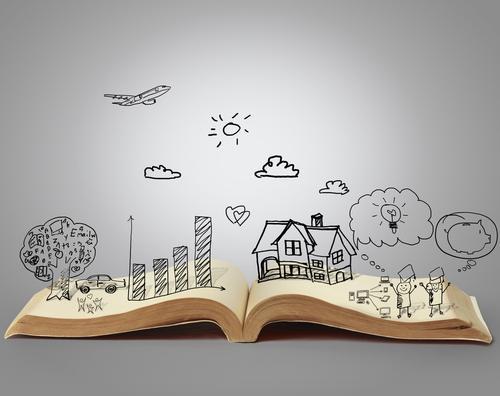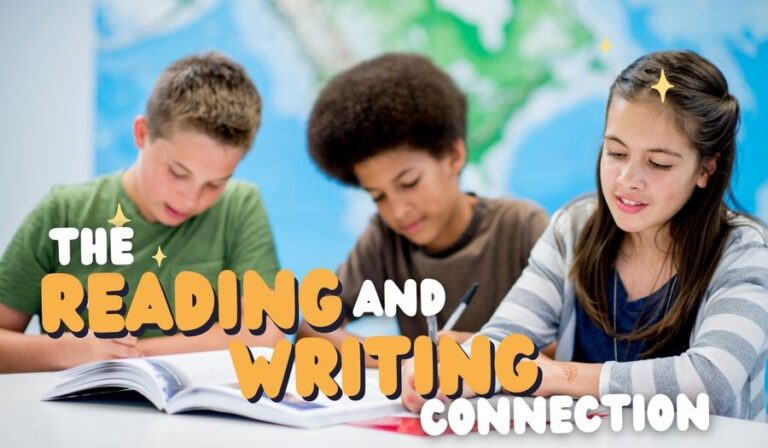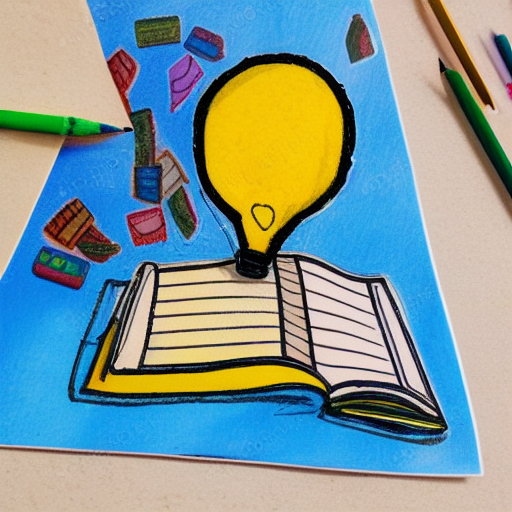

Beyond Words: The Far-Reaching Effects of Writing on Society
INTRODUCTION TO THE POWER OF WRITING
Writing is an essential form of communication that has shaped human society for thousands of years. From the earliest cave paintings to the modern digital age, the written word has been an essential tool for conveying information, preserving history, and expressing emotions. In today's world, writing has become even more important as we rely on it for everything from education to business. Join us as we journey beyond words and uncover the profound ways in which writing influences our lives.
HISTORICAL SIGNIFICANCE OF WRITING IN SOCIETY
Writing has been an integral part of human civilization since its inception. The earliest forms of writing, such as Egyptian hieroglyphics and Sumerian cuneiform, date back to around 3000 BCE. These early writing systems were primarily used for record-keeping, such as tracking the exchange of goods and services or documenting historical events.
As human societies became more complex, the need for a more efficient means of communication led to the development of alphabets and more sophisticated writing systems. The invention of the printing press in the 15th century revolutionized the world of writing by making it possible to mass-produce written materials. This development made information more accessible to the masses and contributed to the spread of ideas and knowledge throughout the world.
Throughout history, writing has played a crucial role in shaping society. From the recording of laws and religious texts to the dissemination of philosophical ideas and scientific discoveries, the written word has been instrumental in the evolution of human thought and the development of civilization.
WRITING AS A FORM OF SELF-EXPRESSION
Writing has long been recognized as a powerful form of self-expression. It allows individuals to communicate their thoughts, feelings, and experiences in a way that transcends the limitations of spoken language. Through writing, people can explore their innermost emotions, confront difficult experiences, and share their unique perspectives with others.
Creative writing offers a means of self-expression that allows individuals to explore their imaginations and delve into the depths of their subconscious. Whether through poetry, fiction, or personal essays, writing provides an outlet for individuals to explore their emotions, make sense of their experiences, and connect with others on a deeper level.
Moreover, writing as a form of self-expression can be therapeutic. Many people find solace in putting pen to paper (or fingers to keyboard) to process their emotions and gain insight into their own thoughts and feelings. In this way, writing can be a powerful tool for promoting mental health and emotional well-being.
WRITING AS A TOOL FOR SOCIAL CHANGE
Throughout history, writing has been a powerful force for social change. From the impassioned essays of civil rights activists to the fiery speeches of political revolutionaries, the written word has the power to inspire, motivate, and unite individuals in the pursuit of a common goal.
In many instances, writing has been the catalyst for significant social movements. For example, the works of Enlightenment thinkers such as Voltaire, Rousseau, and Montesquieu helped to lay the groundwork for the French Revolution, while the writings of anti-slavery activists like Frederick Douglass and Harriet Beecher Stowe galvanized the abolitionist movement in the United States.
In the modern era, writing continues to serve as a powerful tool for social change. Social media platforms, blogs, and online publications provide a space for activists, scholars, and ordinary citizens to share their thoughts and opinions on pressing social issues. This democratization of writing has made it possible for marginalized voices to be heard and for grassroots movements to gain traction.
WRITING AS A MEANS OF PRESERVING CULTURE
Writing plays an essential role in the preservation of culture. By documenting history, traditions, and customs, the written word helps to ensure that the rich tapestry of human experience is not lost to the sands of time. In this way, writing serves as a bridge between generations, allowing the wisdom and experiences of the past to inform and enrich the lives of those in the present.
Literature, in particular, plays a crucial role in preserving culture. Through stories, poems, and essays, writers capture the essence of their societies, reflecting the values, beliefs, and experiences of their time. These works of art serve as a cultural record, providing a window into the lives of those who came before us and helping to shape our understanding of the world around us.
In addition, writing can also play a role in the revitalization and preservation of endangered languages and cultural practices. By documenting these languages and traditions in written form, we can help to ensure their survival for future generations.
THE IMPACT OF WRITING ON EDUCATION
Writing is a fundamental component of education. From the earliest stages of learning to read and write, children are taught the importance of literacy as the foundation for acquiring knowledge and developing critical thinking skills. As students progress through their education, the ability to effectively communicate through writing becomes even more crucial.
In higher education, writing is the primary means by which students convey their understanding of complex concepts and engage in intellectual discourse with their peers and instructors. Whether through essays, research papers, or dissertations, writing is the cornerstone of academic success.
Furthermore, writing is not just a skill to be mastered for academic purposes. Effective written communication is essential for success in the workforce as well. In today's globalized economy, the ability to express ideas clearly and persuasively through writing is a highly sought-after skill that can open doors to career advancement and professional growth.
WRITING AND MENTAL HEALTH
The connection between writing and mental health is well-documented. Numerous studies have shown that engaging in expressive writing can have a positive impact on psychological well-being, helping individuals to process emotions, reduce stress, and gain insight into their own thoughts and feelings.
One of the most popular therapeutic writing techniques is journaling. By writing about their experiences, emotions, and thoughts, individuals can gain a deeper understanding of their mental state and work through difficult emotions. Journaling can be particularly helpful for those struggling with anxiety, depression, or trauma, as it provides a safe space for processing and reflection.
In addition to journaling, other forms of writing, such as poetry or fiction, can also serve as a means of emotional expression and healing. Creative writing allows individuals to explore their emotions and experiences in a more abstract and imaginative way, providing an outlet for self-expression that can be both cathartic and empowering.
WRITING IN THE DIGITAL AGE
The digital age has undoubtedly transformed the landscape of writing. With the advent of the internet and the proliferation of digital devices, writing has become more accessible and more diverse than ever before. Today, anyone with an internet connection can publish their own blog, share their thoughts on social media, or contribute to online forums and discussions.
This democratization of writing has had both positive and negative effects on society. On one hand, the digital age has made it possible for a wider range of voices and perspectives to be heard, fostering greater diversity and inclusivity in the world of writing. In addition, the internet has made information more accessible than ever before, promoting the exchange of ideas and knowledge on a global scale.
On the other hand, the digital age has also given rise to new challenges for writers and readers alike. The sheer volume of information available online can be overwhelming, making it difficult for individuals to discern reputable sources from unreliable ones. Furthermore, the rise of social media and the culture of instant gratification have contributed to the decline of long-form writing and the devaluation of thoughtful, nuanced discourse.
THE FUTURE OF WRITING IN SOCIETY
As we look to the future, it is clear that writing will continue to play an essential role in shaping society. While the digital age has brought about significant changes in the way we write and consume information, the fundamental importance of the written word remains unchanged.
In the coming years, we may see a resurgence of long-form writing as individuals and communities recognize the value of thoughtful, in-depth analysis and reflection. Additionally, as technology continues to advance, we may see new and innovative forms of writing emerge, such as virtual reality storytelling or interactive narratives.
However, even as the methods of writing evolve, the core principles of effective communication and self-expression remain constant. As such, it is crucial that we continue to prioritize literacy and writing skills in education and beyond, ensuring that future generations are equipped with the tools they need to communicate effectively and make their voices heard.
In conclusion, writing has far-reaching effects on society today. From its historical significance to its role in self-expression, social change, and culture preservation, writing influences our lives in profound ways. It is essential for education and mental health, and it continues to evolve in the digital age.
As we look to the future, it is clear that writing will remain a crucial tool for communication, expression, and creativity. Whether through traditional forms of writing or new and innovative mediums, the power of the written word will continue to shape our world and our understanding of it.
So, let's continue to write, to read, and to appreciate the beauty and value of the written word. For in doing so, we honor the rich legacy of human civilization and pave the way for a brighter and more connected future.
Thank you for spending your time with us this morning on the HIP Weekly. We appreciate your attention and readership and look forward to seeing you next week. If you enjoyed or learned something form this article, then by all means share it with a friend or colleague! In the meantime, as we always say, have a positive and productive week!
Written by:
Joshua Adams
Senior Editor
Huntsville Independent Press
ABOUT HUNTSVILLE INDEPENDENT PRESS
Huntsville Independent Press is the premiere publishing imprint of the Southeast United States, and we want to help you, the author. HIP provides, at no cost to our signed authors, a better solution for the publication of your story. Our contracts are non-restrictive and offer higher royalties for our authors. No HIP advance is taken out of royalties. Your advance from us is a one-time payment for the privilege to publish your book and is not a loan. Our passionate team of editors work diligently to ensure that the uniqueness of your story is preserved through the editing process. While you’re here, feel free to look around to see if Huntsville Independent Press is the right home for your work. We are always happy to have talented authors find a publishing home here with us.
Recent Posts
Transform your space with words that last with an HIP Exclusive Print
Honoring Faye Rapoport DesPres: Special December Pre-Orders Open Today!
Cover Reveal - Message from a Blue Jay (10th Anniversary Edition)
How Creative Writing Has Changed the World for the Better
by Adam Oakley | Aug 3, 2015 | Storytelling

From Chaucer to Rowling, creative writing has often been the boon to our stressful, busy world.
It started as a way to maintain folklore tradition and tell us tales of knights in shining armor who brought whole countries together ( King Arthur ).

“Excalibur! Forged when the world was young, and bird and beast and flower were one with man…” Excalibur (1981)
But creative writing has now become an absolutely powerful force for good. We see the wisdom of Gandalf and Baggins ( Lord of the Rings )…

“You asked me to find the fourteenth member of this company and I have chosen Mr. Baggins.”
…The humor of Bridget Jones, and the horror that only Stephen King ( The Shining) can produce.
Whether you read or write a high fantasy novel or an epic crime drama, there will be an amazing impact. Creative writers of all types have brought about amazing results for the world and all they did was grab the nearest pen, typewriter, or computer and got down to writing.
I want to take a look at just how powerful creative writing has been for our society and just how it has changed the world for the better.
7 Amazing Instances of Creative Writing Impacting the World
Creative writing has been a huge part of making the world a better place. Here are some awesome instances of just how powerful it is.
1. It Captured Oral Tradition Giving Us Amazing Stories to Look Back At. When you think of creative writing, one of the first things many think of is the stories of the Brothers Grimm. They are dark and full of terrors, but those stories are also incredible for many reasons.
One reason these stories are so immensely powerful isn’t just because they provided us with great fairy tales that influenced our popular films, but they also captured history.
The Brothers Grimm traveled around, learning some of the popular folklore that was told in one way and one way only – orally. We all know how much impact those stories had (just look at all the Disney films we have).

Preserved in time by the talents of a pen…
What would have happened if the Brothers Grimm hadn’t stored these stories? What would the world look like now? What a fascinating, and slightly terrifying thought to think. By writing down these creative folk stories, the Brothers Grimm opened a whole new world of creative possibility.
2. Creative Writing Has Shown Immense Power in Physical Health. When the Brothers Grimm popularized creative literature, they probably didn’t realize what this would mean for the world.
A huge impact that all creative writing has had, no matter its age, genre, or format, is that of improving physical and mental health. There are so many amazing health benefits when you read creative literature, and that is a pretty awesome impact if you ask me.
When you write creatively , you can see some health benefits such as the ability to improve your memory and have a great format to release pent up emotions.
Reading creative literature also gives you immense health benefits including better cognition, relieving stress, and helping you sleep. That’s right, if you have a hard time sleeping, reading a good book might just be what you need.
The great thing about this is that creative writing and literature doesn’t have to be one type of thing – it can be anything. It can be a comic book, a science fiction novel, the latest study, or a great nonfiction book.
3. A Simple Novella Can be a Letter to a Loved One. Another way that creative writing has made the world a better place is actually something rather small. But, as well all know, those small things add up to something major in the end.
Neil Gaiman is an amazing author with an impressive range of works including The Ocean at the End of the Lane . While this seems like a jaunt into urban fantasy, there is something much deeper. This story started out as a simple, small letter to his soon-to-be-wife, Amanda Palmer.
He wanted to make sure she knew things about him, and he wanted to share his life with her, and creative writing was what helped him achieve this. It ended up turning into an absolutely gorgeous novella, but his small action was something Amanda greatly appreciated.
It might not have made a worldwide impact, but a small gesture through creative writing can change someone’s world for the better. And Amanda experienced something that many of us would absolutely enjoy.
4. Creative Writing Might Send You to San Francisco with Flowers in Your Hair. When you look at the world of creative writing, there are so many facets. There are books, ad campaigns, music, and more.
The 1960s and 1970s were a powerful decade when it came to moving and emotional creative writing. The United States was at war with Viet Nam, with protestors calling for peace. America and the entire world were also on the cusp of major social change.
And music and creative writing had an important role to play.
We had songs about peace, encouraging people to avoid war and work together to meet a resolution without the shedding of blood. People marched singing these songs, hung around in large groups with these songs, and many were backdrops to some of the most intense and saddest moments in American history.
Not only did we have songs about peace, but we also had songs about racial problems around the world but specifically in America. We had books such as To Kill a Mockingbird that highlighted these problems and a speech no one will ever forget :
“I have a dream…”
5. Fiction and Creative Writing Help Create Literate Children and Adults. I’ll admit, when it comes to creative writing and literature, my go-to author is Neil Gaiman. He has great wisdom about creative writing and its importance and he often illustrates that importance himself.
In an article for The Guardian , Neil talks about the importance of creative writing, specifically that of fiction. He points out how fiction can improve someone’s life, no matter if they are reading to escape, learn, or have fun.
He believes, and rightly so, that with literature, we open the door to a healthy society as well as a more literate culture. Did you know that New York City gauged the prison growth rate off of the amount of 10 and 11-year-olds that couldn’t read?
Now, what does that say about the need for literacy? Quite a bit.
While Neil does point out that a literate society does not equal a crime-free one, there is an immense impact of literature, bettering the world.
Creative writing and reading gives people the chance to formulate their opinions and to learn about other views. There are many things a person can learn just by reading and fiction has long had an amazing impact on many readers.
6. Creative Writing Provides Powerful Ads that Cannot Be Ignored. Powerful creativity isn’t just something you see in books and music but is also amazingly powerful in the ad world.
On September 11th, 2001, America saw one of the worst terrorist attacks on their soil and the world felt the immense grief radiating out from New York City, the Pentagon, and Pennsylvania. People everywhere were making tributes to the fallen on that day, and there was one particular ad that brought everyone to tears.
Budweiser paid a gorgeous tribute to those who died that day with a Super Bowl ad that only ran for a brief time.

The lovely America, captured in the Budweiser 9/11 tribute ad.
Advertising has done more than just paying tribute; they’ve raised awareness for issues, focused on social change , and worked to bring people together.
One such ad is a Spanish advertisement that only children could fully see . It sent out a message that if a child was being abused, he or she could reach out.
This was met with a fanfare of those who thought it was great and criticism from those who didn’t know if it would work. Regardless, it was still a great, powerful ad.
7. A Simple Children’s Story Can be Immensely Complex. What do I mean with those contradicting words? Easy – Harry Potter, when looked at on the surface, is a simple children’s story, it has all the elements.

The talents of J.K. Rowling.
However, it is also immensely complex. Rowling dealt with many issues that children’s literature often didn’t, which could be a major reason why so many adults read it.
This series impacted the world amazingly by giving people something positive in a dark time. And it also brought about something great – literacy.
It inspired so many children to read, especially those who weren’t big readers. It brought about a love for reading, which really did impact the world for the better.
In addition, a 2003 article from the University of North Texas pointed out that it also helped create discussion between children and adults.
Never Be Afraid to Read and Write What You Want
Creative writing really has had an immense impact on the world, changing it for the better, hasn’t it? No matter what it is you are reading or writing, know that it is exactly what you need.
It might get you through a hard time in your life, encourage you to try new things, and if you’re a business owner, help you bring in new clients.
Creative writing is just another thing Express Writers offers, and our team can help you get something epic and creative that people will definitely enjoy.
Photo credits: The Telegraph (King Arthur), John Howe (Lord of the Rings), Goodreads (book cover, Grimm), Marshall.edu (Harry Potter book cover)
Download your Free copy of How Creative Writing Has Changed the World for the Better
Creative Writing: What It Is and Why It Matters
By: Author Paul Jenkins
Posted on Published: January 13, 2023 - Last updated: January 15, 2023
Categories Writing
Writing can be intimidating for many people, but creative writing doesn’t have to be. Creative writing is a form of self-expression that allows writers to create stories, characters, and unique settings. But what exactly is creative writing? And why is it important in today’s society? Let’s explore this further.
How We Define Creative Writing
Creative writing is any form where writers can express their thoughts and feelings imaginatively. This type of writing allows authors to draw on their imagination when creating stories and characters and play with language and structure. While there are no boundaries in creative writing, most pieces will contain dialogue, description, and narrative elements.
The Importance of Creative Writing
Creative writing is important because:
- It helps us express ourselves in ways we may not be able to do with other forms of communication.
- It allows us to explore our creativity and think outside the box.
- It can help us better understand our emotions by exploring them through storytelling or poetry.
- Writing creatively can also provide much-needed escapism from everyday life, allowing us to escape into a world of our creation.
- Creative writing helps us connect with others by sharing our experiences through stories or poems they can relate to. This way, we can gain insight into other people’s lives while giving them insight into ours.
Creative Writing: A Path to Mental and Emotional Wellness
Writing is more than just a way to express your thoughts on paper. It’s a powerful tool that can be used as a form of therapy. Creative writing has been shown to improve emotional and mental well-being.
Through creative writing, we can gain insight into our emotions, develop self-expression and communication skills, cultivate empathy and understanding of others, and boost our imagination and creativity.
Let’s examine how creative writing can relieve stress and emotional catharsis.
Stress Relief and Emotional Catharsis
Writing has the power to reduce stress levels significantly. Writing about our experiences or about things that are causing us anxiety or distress helps us to release those complicated feelings constructively. By expressing ourselves through creative writing, we can work through the emotions associated with stressful situations without having to confront them directly.
This is especially helpful for people who struggle to share their emotions verbally or in person.
Improved Communication and Self-Expression
Creative writing is also beneficial for improving communication skills. Through creative writing, we can explore our thoughts and feelings more intensely than by speaking them aloud. This allows us to think more clearly about what we want to say before actually saying it out loud or in written form, which leads to improved self-expression overall.
Additionally, writing out our thoughts before speaking aloud allows us to articulate ourselves better when communicating with others—which is essential for healthy personal and professional relationships.
Increased Empathy and Understanding of Others
Through creative writing, we can also increase our empathy towards others by exploring different perspectives on various topics that may be unfamiliar or uncomfortable for us—such as racism, homophobia, sexism, etc.—and allowing ourselves the opportunity to see the situation from someone else’s point of view without judgment or bias. This helps us become better communicators and more understanding individuals overall.
The Professional Benefits of Creative Writing
Creative writing is a powerful tool that can help you communicate better and more effectively in the professional world. It can also help you develop various skills that prove invaluable in many industries. Whether you’re looking to build your résumé or improve your communication, creative writing can effectively achieve both.
Let’s take a closer look at how creative writing can benefit your career.
Preparing Students for Careers in Writing, Editing, and Publishing
Creative writing is the perfect foundation for anyone interested in pursuing a career in writing, editing, or publishing. It teaches students the basics of grammar and composition while allowing them to express their ideas in imaginative ways.
Creative writing classes also allow students to learn from professionals who have experience as editors, agents, and publishers. They can use this knowledge to learn creative writing, refine their craft and gain valuable experience before entering the job market.
Improving Skills in Storytelling and Marketing for Various Careers
Creative writing teaches students to think critically about stories and craft compelling narratives that draw readers in. This skill is precious for those who wish to pursue careers outside traditional writing roles—such as marketing or advertising—where storytelling is key.
People who understand the fundamentals of creative writing will be able to create persuasive copy that resonates with readers and effectively conveys a message.
Enhancing Team Collaboration and Leadership Skills
Creative writing isn’t just about expressing yourself through words; it also provides an opportunity to practice working collaboratively with others on projects. Many creative writing classes require students to work together on group projects, which helps them develop essential teamwork skills such as communication, critical thinking, problem-solving, and creativity.
As they work together on these projects, they will also gain confidence in their ability to lead teams effectively—an invaluable asset no matter what industry they pursue after graduation.
Uncovering the Power of Creative Writing
Creative writing has become an increasingly powerful force in shaping our society. Creative writing has many uses, from preserving cultural heritage to promoting social change.
Preserving Cultural Heritage with Creative Writing
Creative writing has long been used to preserve and share cultural heritage stories. This is done through fictional stories or poetry that explore a particular culture or group’s history, values, and beliefs. By weaving these stories in an engaging way, writers can bring a culture’s history and traditions to life for readers worldwide. This helps bridge cultural gaps by providing insight into what makes each culture unique.
Promoting Social Change & Activism with Creative Writing
Creative writing can also be used for activism and social change. Writers can craft stories that help promote awareness about important issues such as poverty, race relations, gender equality, climate change, and more.
With the power of words, writers can inspire readers to take action on these issues and work towards creating positive change in their communities.
Through creative writing, writers can raise awareness about important topics while fostering empathy toward individuals who may be facing difficult or challenging situations.
Fostering Creativity & Innovation with Creative Writing
Finally, creative writing can foster creativity and innovation in various fields. For example, businesses can use creative copywriting techniques to create compelling content that captures the attention of customers or potential investors.
Aspiring entrepreneurs can use storytelling techniques when pitching their ideas or products to potential partners or investors to make their cases more persuasive and memorable.
By harnessing the power of words through creative writing techniques, businesses can create content that resonates with their target audience while inspiring them to take action on whatever message they’re trying to convey. It often aids the overall creative process.
Frequently Asked Questions
What are the benefits of creative writing.
Creative writing has many benefits, both for the writer and the reader. For the writer, it can be therapeutic, helping them to explore their emotions and better understand themselves. It can also be used as entertainment or communication, allowing them to share their ideas with the world. For the reader, creative writing can provide enjoyment, escapism, and insights into the human condition.
How can I improve my creative writing skills?
There are several ways you can improve your creative writing skills. Firstly, make sure you allow yourself time to write regularly. Use a writing prompt to inspire a short story. Secondly, read as much as you can; great writers are also great readers. Thirdly, experiment with different styles and genres to find one that suits you best. Fourthly, join a writers’ group, writing workshop, or creative writing program to get feedback from other writers. Finally, keep a journal to track your progress and reflect on your work as a creative writer.
What is the importance of imagery in creative writing?
Imagery is an important element of creative writing, as it helps to create a more vivid picture for the reader. By using sensory and descriptive language, writers can transport readers into their stories and help them relate to their characters or themes. Imagery can bring a scene alive with detail and evoke emotion by helping readers create strong visual images in their minds. Furthermore, imagery can help make stories more memorable by giving readers a deeper connection with the characters or setting.
What are the elements of creative writing?
The elements of creative writing include plot, character, dialogue, setting, theme, and point of view. The plot is the structure or main storyline, while the character is the personage involved in this story. Dialogue includes conversations between characters to give insight into their emotions and relationships. Setting refers to the place or time in which a story takes place, while theme explores deeper meanings behind a story’s narrative. Finally, point of view defines how readers experience a story through first-person or third-person omniscient narration.
What’s the difference between creative writing and other types of writing?
The main difference between creative writing and other types of writing is that it allows the writer to create their own story, characters, settings, and themes. Creative writing also encourages writers to be inventive with their style and use descriptive language to evoke emotion or bring stories alive in readers’ minds. Other academic or technical writing types typically involve more research-based information and are usually more objective in their presentation. Additionally, most forms of non-creative writing will have stricter rules regarding grammar, structure, and syntax.
What is the golden rule of creative writing?
The golden rule of creative writing is to show, not tell. It’s the core creative writing skill. When it comes to creative writing, it’s essential to use descriptive language that immerses readers in the story and allows them to experience the events through their emotions and imaginations. This can be done through metaphors, similes, sensory language, and vivid imagery.
How important is creativity in writing?
Creativity is essential in writing as it allows writers to craft a unique story and evoke emotion from the reader. Creativity can bring stories alive with fresh perspectives and exciting plot lines while creating an escape for readers and giving them more profound insights into the human condition. Writers who combine creativity with technical aspects such as grammar, structure, language usage, and flow will create pieces that capture their audience’s attention and provide an enjoyable reading experience.

- Heart & Soul
- The Dreamer
The Connection Between Creative Writing and Living a Fulfilled, Meaningful Life
- Posted on March 21, 2022 March 21, 2022
- 4 minute read
- by Sophie Caldecott

A magical land at the back of an old wardrobe; a dystopian future where all humans are bred in test tubes and assigned a rigid place in society; an orphaned teenager who is repeatedly saved from death because his parents’ love cast a protective spell over him as a baby.
Sometimes you really do have to stop and marvel at the incredible power of human imagination expressed in fiction.
So, what sets creative writing apart from other forms of creativity — even from other forms of writing, such as non-fiction, memoir and poetry? I believe that it strengthens three muscles each and every one of us needs to live a fulfilled and meaningful life.
You don’t have to be an aspiring novelist to experience the unique power of creative writing, either; just pick up a pen or your laptop and let your imagination take over for an hour or so. Even if you never show anyone what you’ve written, you might discover something new about yourself and the world around you.
Writing in any form is always rooted in our own experience, and requires us to be alive to the world and individuals around us so that we can observe and then record what we see, hear, smell, think and feel.
Creative writing demands that we go even deeper than this, though; if we’re going to build an engaging fictional world and craft compelling stories, we have to populate them with believable, unique characters. Every time we tell a story, we have to step outside of ourselves and engage in different perspectives from our own. We have to imagine what it would be like to be someone else, someone with a different childhood, a different temperament, different strengths, flaws, gifts, passions and biases. We have to use radical empathy to imagine motivations, reactions and fears that aren’t our own.
Writing stories can help us to learn to live peacefully within the tangled question of human difference and uniqueness; to borrow words from the great poet Rainer Maria Rilke, writing encourages you to learn to “Be patient toward all that is unsolved in your heart,” teaching you “to love the questions themselves, like locked rooms and like books that are now written in a very foreign tongue.”
Every time we tell a story, we have to step outside of ourselves and engage in different perspectives from our own.
IMAGINATION
No matter how much you enjoy writing, or how good you become at it, there’s no getting away from the fact that it’s hard work. It takes a huge amount of discipline, and there’s a reason people talk so much about “writer’s block.” When you sit down and try to force yourself to be creative and use your imagination, it can initially feel like you just don’t have what it takes. Nope, no new or interesting ideas in this brain today — sorry!
But, with practice, discipline and the patience to push through the initial self-doubt (and yes, boredom), you’ll learn that imagination is a muscle that can be strengthened with enough practice and awareness.
In her book, “Bored and Brilliant: How Time Spent Doing Nothing Changes Everything”, science journalist Manoush Zomorodi shares that recent studies on the neuroscience of day-dreaming and mind-wandering suggest a whole host of benefits, including enhanced problem-solving, creative thinking, empathy, self-awareness and moral judgement.
Jonathan Smallwood, a neuroscientist who has devoted his work to studying daydreaming, says that spacing out (and using our imagination) “could be at the crux of what makes humans different from less complicated animals.”
Meanwhile, the benefits of make-believe and play in many different contexts have become widely recognized in recent years. Studies show that play helps us to cope with stress better; it’s therapeutic, and can increase our productivity.
Creative writing, of course, is just one way of many to unwind, play and use your imagination, but it’s a very powerful one. Letting our imaginations run wild within the safe space of a story, we’re freed to explore ideas and experiences that we might otherwise shy away from putting into words in any other situation.
C.S. Lewis wrote that true humility involves a kind of self-forgetting: “[the truly humble person] will not be thinking about himself at all.” The act of creative writing can leave us feeling vulnerable, child-like and even silly at times; it humbles us by taking us out of ourselves and requiring us to forget ourselves for a while. It encourages us to be open to unfamiliar ideas and perspectives, and in the process we can return to a child-like state of imaginative exploration, if we’re lucky.
This kind of humility can have hugely positive, knock-on effects on our ability to relate to those around us, which is especially valuable in this age of global connection and conflict. And, if you’re willing to put aside your pride and risk feeling a little foolish by writing a story, you’ll likely be blessed with a renewed sense of child-like wonder for the world around you.
Have you tried creative writing? Which fiction stories have stuck with you?
Feature Image via Sarah Eliza Roberts for Darling Issue No. 24

Related Topics
Sophie caldecott.
Sophie is a freelance writer and journalist living in the South West of England on the edge of the moor. She loves adventures in beautiful places, believes in the power of empathy, often wishes she lived in a Jane Austen novel and loves nothing more than a good book and a cup of hot chocolate.

- Relationships
- Relationships & Advice
- The Confidant
An Antidote for the Overcommitted: 3 Questions to Ask Before Saying ‘Yes’
- Posted on March 14, 2022 February 28, 2022
- by Annika Hoiem

Your Future Self is Smart; It’s Time to Take Her Advice
- Posted on March 23, 2022 March 22, 2022
- by Kacey Waxler
You May Also Like

- Career & Purpose
From Freelance Designer to Full-Time Artist: Embracing The Journey of Creative Evolution
- Posted on October 19, 2023
- by Anna Núñez

- Hospitality & Home
Christmas Morning: Swedish Pancakes with Fresh Cranberry Compote
- Posted on December 23, 2022 December 22, 2022
- by Aubree Holmes

Clean Christmas Baking: Figgy Pudding & Gingerbread Cookies
- Posted on December 17, 2022 December 16, 2022

Holiday Recipes That All Your Friends Can Eat + Meet Aubree Holmes!
- Posted on November 21, 2022

- Contemplation
A Poem for Spring
- Posted on May 23, 2022 May 24, 2022
- by Lilian Grace

A Poem for Mother’s Day
- Posted on May 8, 2022 May 8, 2022

Why You’re Not Too Young to Begin Building a Legacy
- Posted on April 29, 2022 April 22, 2022
- by Victoria Sowell

In a Hurting World, Why Our Self-Compassion Needs a Check
- Posted on April 27, 2022 April 22, 2022
- by Rebecca Bass-Ching
I agree with how creative writing can increase one’s empathy towards others. I am constantly putting myself in my character’s shoes to understand how they think and are feeling in the moment and it has caused me to do the same with those around me.
Thank you for your words! I whole-heartedly agree and have been challenging myself and others to make time for creative pursuits daily. It’s so stretching, healing, and freeing!
I was just doing more research on the college I want to go to for creative writing this morning. I am currently writing a book about modelling industries and some of the things these companies try to hide from the world through the perspective of a young girl. This article was very helpful and ironic since I was just doing more research on creative writing before I decided to read the latest Darling articles!
Leave a Reply Cancel reply
Your email address will not be published. Required fields are marked *
Save my name, email, and website in this browser for the next time I comment.
Input your search keywords and press Enter.

How Writing Can Change the World
By Anna Gibbs
Whether it be a speech, a poem, or an op-ed, words carry power. Words share experiences, inspire empathy, and evoke emotion. Words change minds. They can have huge impacts, be it new legislation or cultural shifts. When thinking about writing that has made a difference, you might first think of speeches, like Martin Luther King Jr.’s famous “I Have a Dream” speech at the height of the Civil Rights Movement. But every type of writing can lead to real change.
Let’s look at some examples.

Letter to the Editor and Op-Ed
The cool thing about letters to the editor and op-eds is that anyone can write one and reach a large audience — some larger than others. Twelve-year-old Julianne Speyer’s viral letter to her local newspaper in Ohio reached millions of people across the country. She had written to the editor about sexist comments made at a Fourth of July parade.
The organizers of the parade responded by calling the comments an “unfortunate misunderstanding.” But Speyer’s letter resonated with people around the country and illuminated implicit sexism that affects girls of all ages. The most important impact of letters like Speyer’s may be their ability to affect individuals’ opinions. A 2019 study found evidence that opinion pieces do, in fact, change minds: a randomized experiment with 3,567 participants showed that newspaper op-eds had “large and long-lasting effects” on people’s beliefs.
Letter
In 1920, women were on the brink of securing the right to vote. But to do so, three-fourths of states—36 total—needed to ratify the 19th Amendment. Thirty-five states had ratified the amendment. Tennessee was the 36th state slated for a vote, and the House was split straight down the middle. On the morning of the vote, Tennessee House Representative Harry Thomas Burn woke up planning to vote against women’s suffrage. To everyone’s surprise, he went on to cast the deciding vote in favor of the amendment.
He later explained that he had received a letter from his mother, Febb Ensminger Burn, urging him to vote for women’s suffrage. He carried the letter in his jacket pocket to the polls, and ultimately his mother’s words were the tipping point for him. Mrs. Burn’s letter changed the course of history that day.
Most of us have heard Greta Thunberg’s fervent speech that she gave at the UN last year. (If you haven’t already listened to it, check it out here .) But have her words made a real impact? Climate scientists all agree: Yes! Sally Benson, co-director of the Precourt Institute for Energy at Stanford University, believes that Thunberg is mobilizing other young people to join in the fight. “We’re seeing more grassroots action, and she’s creating a movement where young people are pushing communities, cities, states and corporations and saying, ‘we’re not going to wait,’” Benson said.
On March 15, 2019, Thunberg led more than 1 million students from 123 countries to strike from Friday classes to protest inaction on climate change. She continues to lead student strikes every Friday.
In 1906, American journalist and novelist Upton Sinclair published his book “The Jungle” as an exposé on the terrible working conditions in meat-packing factories. Though the narrative was fictional, the meat-packing descriptions were based on Sinclair’s real visits to the factories, where he witnessed rotten meat being mixed with sawdust, chemicals, and mouse droppings. His words reached the desk of President Theodore Roosevelt, who sent the Labor Commissioner and a social worker to Chicago to investigate the meat-packing facilities.
What they found would lead to the Meat Inspection Act and the Pure Food and Drug Act, which eventually established the Food and Drug Administration (FDA), the organization that approves safety for food and drugs today.
A teacher once told me: “Writing is a form of civic action.”
Please keep writing, dear writers. You’re changing the world, one word at a time.

Share this post:
Similar Blogs

Novel Writing Winners 2018 Announced
This November, many of you joined thousands of people around the world in the novel pursuit of...

Meet Best Peer Review Winner Amalia Costa
You might have already seen the name ‘Amalia Costa’ on Write the World before. Not only is she an...

How to Choose A Novel Excerpt Writing Sample
No one said writing a novel was easy, but the good news is that you’re not alone! This month,...
The Science of Writing
research-based best practices for writing instruction

Pen and Culture: The Intricate Dance of Writing and Cultural Influence
Writing is more than just a tool for communication; it is a reflection of our culture and identity. Cultural factors play a significant role in shaping writing practices worldwide, influencing language diversity, setting norms, and establishing rich writing traditions. In this blog post, we will embark on a journey through the fascinating interplay between writing and culture, exploring how our diverse backgrounds and heritage leave an indelible mark on the written word.
Language Diversity: The Rich Tapestry of Words
Language is the vessel through which culture is conveyed, and it profoundly impacts writing practices. The vast array of languages spoken across the globe gives rise to a rich tapestry of writing styles, syntax, and vocabulary. Each language carries its unique cultural nuances and influences how writers express their thoughts and emotions. The subtleties of a language’s structure often reflect the cultural values and beliefs ingrained within a community.
For instance, languages with strong oral traditions may exhibit a more conversational tone in their writing, while languages with elaborate honorifics may showcase inherent respect and politeness in written communication. Embracing linguistic diversity fosters cultural appreciation and opens doors to diverse perspectives in the world of writing.
Cultural Norms: Unwritten Rules of Expression
Culture sets the stage for unwritten rules that govern writing practices. Social norms, values, and beliefs seep into the fabric of written communication, dictating acceptable forms of expression. In some cultures, direct and explicit writing is preferred, while in others, implicit and indirect communication is valued. Understanding these nuances is crucial when writing for diverse audiences or in cross-cultural contexts.
Additionally, cultural norms influence topics considered taboo or sensitive, affecting the breadth of subjects explored in writing. By acknowledging and respecting these cultural norms, writers can foster cross-cultural understanding and appreciation.
Writing Traditions: Echoes of the Past
Writing traditions carry the weight of history and heritage. From ancient scrolls to modern digital platforms, the way we record and preserve knowledge has evolved over time, shaped by cultural practices. Ancient civilizations etched their stories on stone tablets or papyrus, while medieval scholars meticulously crafted manuscripts. Today, some cultures continue to uphold calligraphy and handwritten letters as cherished traditions.
Furthermore, certain cultures have revered literary genres or poetic forms that have been passed down through generations. The essence of these traditions persists in contemporary literature, keeping cultural heritage alive through the written word.
Language Revival and Cultural Renaissance
Writing can also be a potent tool in reviving endangered languages and cultures. As languages face the threat of extinction due to globalization, writing plays a crucial role in documenting and preserving the knowledge and traditions of these cultures. By engaging in creative writing, storytelling, and language revitalization efforts, writers can contribute to the renaissance of fading cultures and languages.
Writing and culture are inherently intertwined, influencing each other in a dance of creativity, expression, and identity. Language diversity enriches the tapestry of writing styles, while cultural norms set the boundaries for expression. Writing traditions carry the echoes of the past, connecting us to our cultural heritage.
As writers, we must embrace the beauty of cultural influence and ensure that our words are bridges of understanding and empathy between cultures. By valuing and respecting diverse writing practices, we open doors to a world of shared experiences and collective wisdom. Let us celebrate the marriage of pen and culture, scribing stories that transcend boundaries and unite us in the beauty of human expression.
Similar Posts

The Science of Outlining: Improving Organization in Writing
As students progress through their academic careers, the expectation for clear and organized writing becomes increasingly important. One way to achieve this is by using outlines to structure written work. Outlining is a powerful tool that can improve writing in numerous ways, from providing clarity and focus to helping students stay on track with their…

Empowering Creativity: The place for AI in Writing Instruction and Grammar
The ability and courage to develop a voice and express oneself freely and creatively is of paramount importance in early writing instruction. At Pressto, we believe that grammar and spelling can be impediments to all early writing. We’ve turned off grammar and spell checking. Kids who use Pressto write more frequently and creatively, and they…

AI Writing: Revolutionizing the Future of Content Creation
Artificial intelligence (AI) has become increasingly prominent in various aspects of our lives, and the field of writing is no exception. From automated content generation to language translation, AI is revolutionizing how we produce and consume written content. In this blog post, we will delve into the emerging role of AI in writing, examining its…

The Power of Grammar and Syntax: Enhancing Clarity and Comprehension in Written Communication
Effective written communication relies on more than just conveying ideas; it also depends on the proper use of grammar and syntax. Grammar and syntax serve as the backbone of written language, providing structure and coherence to our words. In this blog post, we will explore the importance of grammar and syntax in written communication, highlighting…

How Reading Affects Writing: Insights from Cognitive Psychology
Reading and writing are closely related skills that rely on many of the same cognitive processes. When you read, you are using your brain to process and interpret written language, and when you write, you are using your brain to generate and express written language. There is evidence to suggest that reading can have a…

Inspiring Creativity and Motivation: Igniting the Passion for Writing with Pressto
Writing, at its core, is an art form that allows individuals to express their thoughts, emotions, and imaginations. Yet, motivating students to embrace this art with enthusiasm can sometimes be a challenge. Enter the world of inspiring and engaging writing experiences, where creativity flourishes, and motivation soars. In this blog post, we will delve into…
Leave a Reply Cancel reply
Your email address will not be published. Required fields are marked *
Save my name, email, and website in this browser for the next time I comment.

IMAGES
COMMENTS
Creative writing allows individuals to explore their emotions and experiences in a more abstract and imaginative way, providing an outlet for self-expression that can be both cathartic and empowering. ... writing has far-reaching effects on society today. From its historical significance to its role in self-expression, social change, and ...
I want to take a look at just how powerful creative writing has been for our society and just how it has changed the world for the better. 7 Amazing Instances of Creative Writing Impacting the World. Creative writing has been a huge part of making the world a better place. Here are some awesome instances of just how powerful it is. 1.
Research focusing on writing as a creative outlet and therapeutic intervention has provided valuable insights into its healing properties. ... A crucial need exists for longitudinal studies that can provide insights into the long-term effects of creative engagement on mental health, offering a more dynamic understanding of its impact over time ...
Creative writing is a form of self-expression that allows writers to create stories, characters, and unique settings. But what exactly is Writing can be intimidating for many people, but creative writing doesn't have to be. ... Creative writing has become an increasingly powerful force in shaping our society. Creative writing has many uses ...
The act of creative writing can leave us feeling vulnerable, child-like and even silly at times; it humbles us by taking us out of ourselves and requiring us to forget ourselves for a while. It encourages us to be open to unfamiliar ideas and perspectives, and in the process we can return to a child-like state of imaginative exploration, if we ...
3. We can legitimize: Think about who we quote, cite, feature, center. Systemic forces work against us here. The biases of our society and our minds will make us more likely to hear about, talk about, and read about voices from dominant groups (here is an example of one analysis).My co-authored research has shown the power of a longer shortlist when trying to generate more gender-diverse ...
Creative writing heals: A South African study highlights how expressive writing courses improve mental health and wellness, offering a cost-effective, non-medical aid for psychological well-being. ... particularly where trauma, limited resources and a need to build a caring and compassionate society exist. ... Light affects mood and mental ...
The most important impact of letters like Speyer's may be their ability to affect individuals' opinions. A 2019 study found evidence that opinion pieces do, in fact, change minds: a randomized experiment with 3,567 participants showed that newspaper op-eds had "large and long-lasting effects" on people's beliefs. Letter
By engaging in creative writing, storytelling, and language revitalization efforts, writers can contribute to the renaissance of fading cultures and languages. Conclusion. Writing and culture are inherently intertwined, influencing each other in a dance of creativity, expression, and identity. Language diversity enriches the tapestry of writing ...
by ordering his minister of Education to that effect. The quest for beauty which a work of art is presupposes freedom for the artist as its sine qua non. This assertion is not a plea for absolute freedom for the writers. This is just an emphasis of the funda mental fact of the creative process. A few words from Lenin may be quoted in support of ...